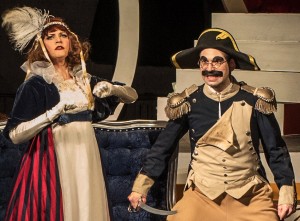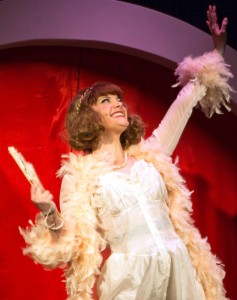The Marx Brothers—four actual brothers, best known for their timely political commentary, sophisticated puns and physicalized comedy—left no stone unturned. They poked fun at everyone and everything: aristocrats, hobos, history, and especially relationships between men and women. I’ll Say She Is, now at the Connelly Theater, written by Will B. Johnstone, went to Broadway in 1924 and put the Marx Brothers on the map. Their rise was mercurial, and they made many movies that spread their popularity even wider.
But I’ll Say She Is, unlike their other stage shows, never became a film. It centers on a rich heiress named Beauty, played by the lovely Melody Jane, whose problem—“Society Woman Craves Excitement”—headlines the newspapers. The Marx Brothers, actors looking for work, are sent by their casting agent to woo her, and presumably get money from her. After all, her problem seems to be of great local concern. Fabulously rich, she lives with her also very wealthy aunt, Ruby, played by Kathy Biehl, who lends the role the right amount of stentorian authority. When the Brothers arrive at Ruby and Beauty’s door, the butler, played comically by C.L. Weatherstone, asks: “Gentlemen, did you come by appointment?” to which Chico responds, “No, we came by subway.”
The literal use of language is what made the Marx Brothers so brilliant. When Chico asks Harpo to cut the cards, he takes out an ax and chops them up. However, their comedy doesn’t completely rely on fast-paced antics. Instead, there are many quieter, more theatrical moments, as well as moments that showcase the array of talent the Marx Brothers had. Harpo was a gifted harpist, and Chico learned to play the piano with a special one-handed technique, and the actors successfully capture these talents.
When actors play famous personae, we want to see exactness, but what we really should be looking for is likeness. The four actors who play the Marx Brothers do a fantastic job of capturing the broader aspects of each of the brothers’ personas. And personas they were. Matt Roper captures Chico’s tight-lipped, one-sided grin, casts the sideways glances that made Chico seem both wary and earnest. Seth Shelden plays Harpo’s muteness with energy. Harpo was a pickpocket of sorts, and to recreate this theatrically takes a certain kind of magician’s ability. In one scene, Ruby suspects that he has stolen some cutlery, but she then backs off her claim. At the same time, several forks, spoons and knives fall out of Harpo’s sleeve. Shelden masters the great physical control needed to play Harpo’s mute but mischievous character.
Groucho was surprisingly successful in romance. The older women adored him for his quasi-romantic nature, and sharp humor. During a scene while courting Ruby, she calls, “Ah! My dear! At last I’ve found you.”
Groucho: “Yes, my darling, here I am.”
Ruby: “I was referring to my niece.”
Groucho: “Well, I’ll have you on your niece in no time.”
However, his exaggerated black eyebrows, painted thickly above his own, the long waistcoat, and cigar dangling from the side of his mouth make him also the most comical-looking. Noah Diamond does a wonderful job of getting Groucho’s famous walk just right with the back bent forward, and knees in a deep plié that often made Groucho look like he was gliding across the room.
And last but not least, Matt Walters plays Zeppo with all the leading-man charm reminiscent of those classic film stars Cary Grant and Clark Gable. Beauty falls in love with him at the end of the play and realizes that “there is no greater thrill than the thrill of love.”
Diamond lovingly restored the lost script by working with Johnstone’s rehearsal notes to adapt the play to the Connelly Theater, a historic venue dating back to the mid-1800s. Director Amanda Sisk, choreographer Shea Sullivan, and musical director Sabrina Chap do a marvelous job of capturing the voluptuousness of a Broadway revue during the age of vaudeville. The play, produced by Trav S.D., includes an array of 10 chorus dancers who are a triple threat: they dance, sing, and act. And of course, they all tap-dance. In their sparkly art deco dresses they bring an additional vibrancy to the stage that makes the play all the more fun in its reminiscence of a vaudeville spectacle.
I’ll Say She Is runs through July 3 at the Connelly Theater (220 E. 4th St., between Avenues A and B). Evening performances are at 8 p.m. Thursdays through Saturdays and at 7 p.m. on Sunday; matinees are at 2 p.m. Sundays. Tickets are $35 ($25 for students and seniors), available at 212-352-3101 or www.illsaysheis.com.








